Globalization Educational Policy & Change Report 2022
VerifiedAdded on 2022/10/19
|12
|3610
|11
AI Summary
Contribute Materials
Your contribution can guide someone’s learning journey. Share your
documents today.
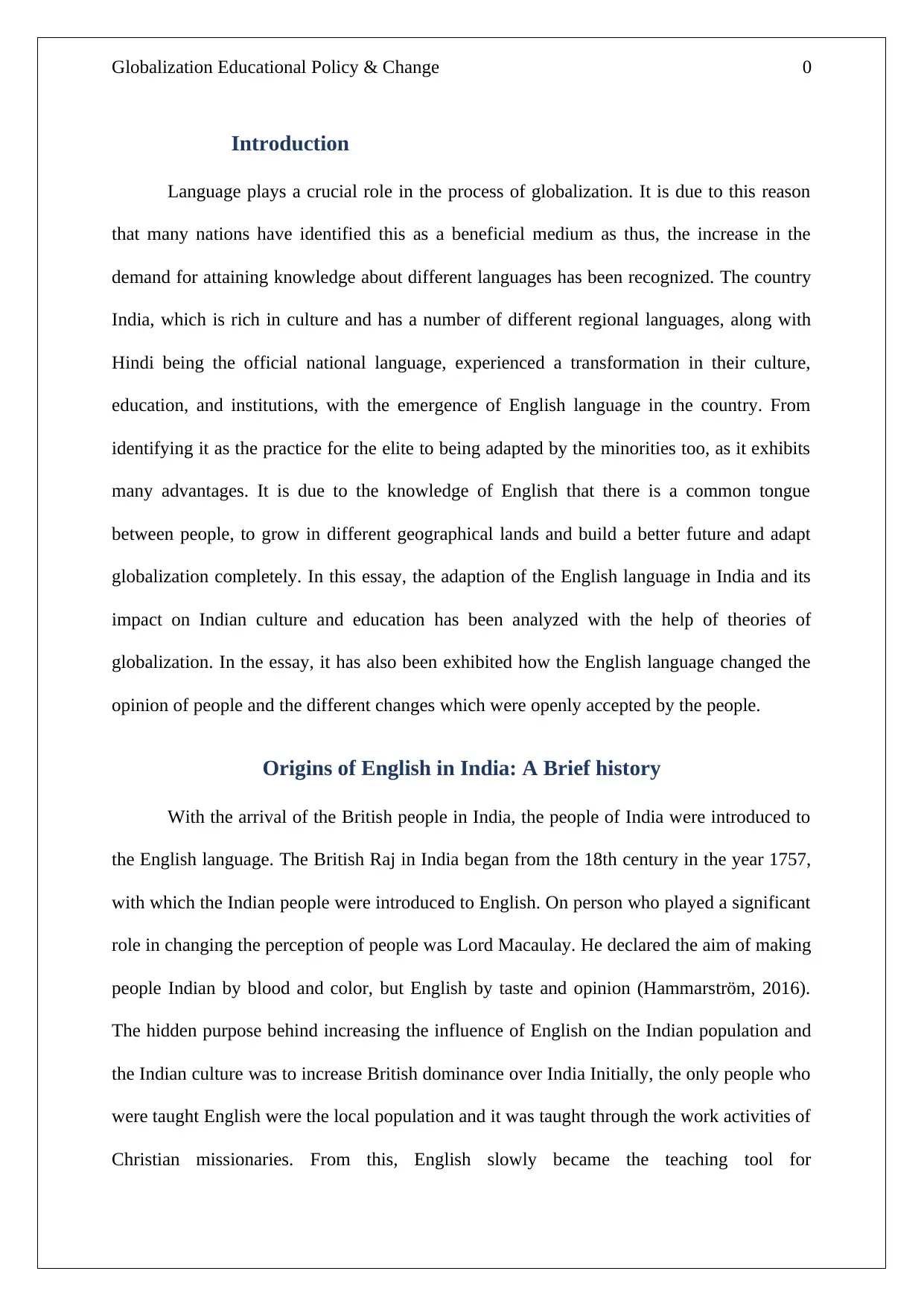
Globalization Educational Policy & Change 0
Introduction
Language plays a crucial role in the process of globalization. It is due to this reason
that many nations have identified this as a beneficial medium as thus, the increase in the
demand for attaining knowledge about different languages has been recognized. The country
India, which is rich in culture and has a number of different regional languages, along with
Hindi being the official national language, experienced a transformation in their culture,
education, and institutions, with the emergence of English language in the country. From
identifying it as the practice for the elite to being adapted by the minorities too, as it exhibits
many advantages. It is due to the knowledge of English that there is a common tongue
between people, to grow in different geographical lands and build a better future and adapt
globalization completely. In this essay, the adaption of the English language in India and its
impact on Indian culture and education has been analyzed with the help of theories of
globalization. In the essay, it has also been exhibited how the English language changed the
opinion of people and the different changes which were openly accepted by the people.
Origins of English in India: A Brief history
With the arrival of the British people in India, the people of India were introduced to
the English language. The British Raj in India began from the 18th century in the year 1757,
with which the Indian people were introduced to English. On person who played a significant
role in changing the perception of people was Lord Macaulay. He declared the aim of making
people Indian by blood and color, but English by taste and opinion (Hammarström, 2016).
The hidden purpose behind increasing the influence of English on the Indian population and
the Indian culture was to increase British dominance over India Initially, the only people who
were taught English were the local population and it was taught through the work activities of
Christian missionaries. From this, English slowly became the teaching tool for
Introduction
Language plays a crucial role in the process of globalization. It is due to this reason
that many nations have identified this as a beneficial medium as thus, the increase in the
demand for attaining knowledge about different languages has been recognized. The country
India, which is rich in culture and has a number of different regional languages, along with
Hindi being the official national language, experienced a transformation in their culture,
education, and institutions, with the emergence of English language in the country. From
identifying it as the practice for the elite to being adapted by the minorities too, as it exhibits
many advantages. It is due to the knowledge of English that there is a common tongue
between people, to grow in different geographical lands and build a better future and adapt
globalization completely. In this essay, the adaption of the English language in India and its
impact on Indian culture and education has been analyzed with the help of theories of
globalization. In the essay, it has also been exhibited how the English language changed the
opinion of people and the different changes which were openly accepted by the people.
Origins of English in India: A Brief history
With the arrival of the British people in India, the people of India were introduced to
the English language. The British Raj in India began from the 18th century in the year 1757,
with which the Indian people were introduced to English. On person who played a significant
role in changing the perception of people was Lord Macaulay. He declared the aim of making
people Indian by blood and color, but English by taste and opinion (Hammarström, 2016).
The hidden purpose behind increasing the influence of English on the Indian population and
the Indian culture was to increase British dominance over India Initially, the only people who
were taught English were the local population and it was taught through the work activities of
Christian missionaries. From this, English slowly became the teaching tool for
Secure Best Marks with AI Grader
Need help grading? Try our AI Grader for instant feedback on your assignments.
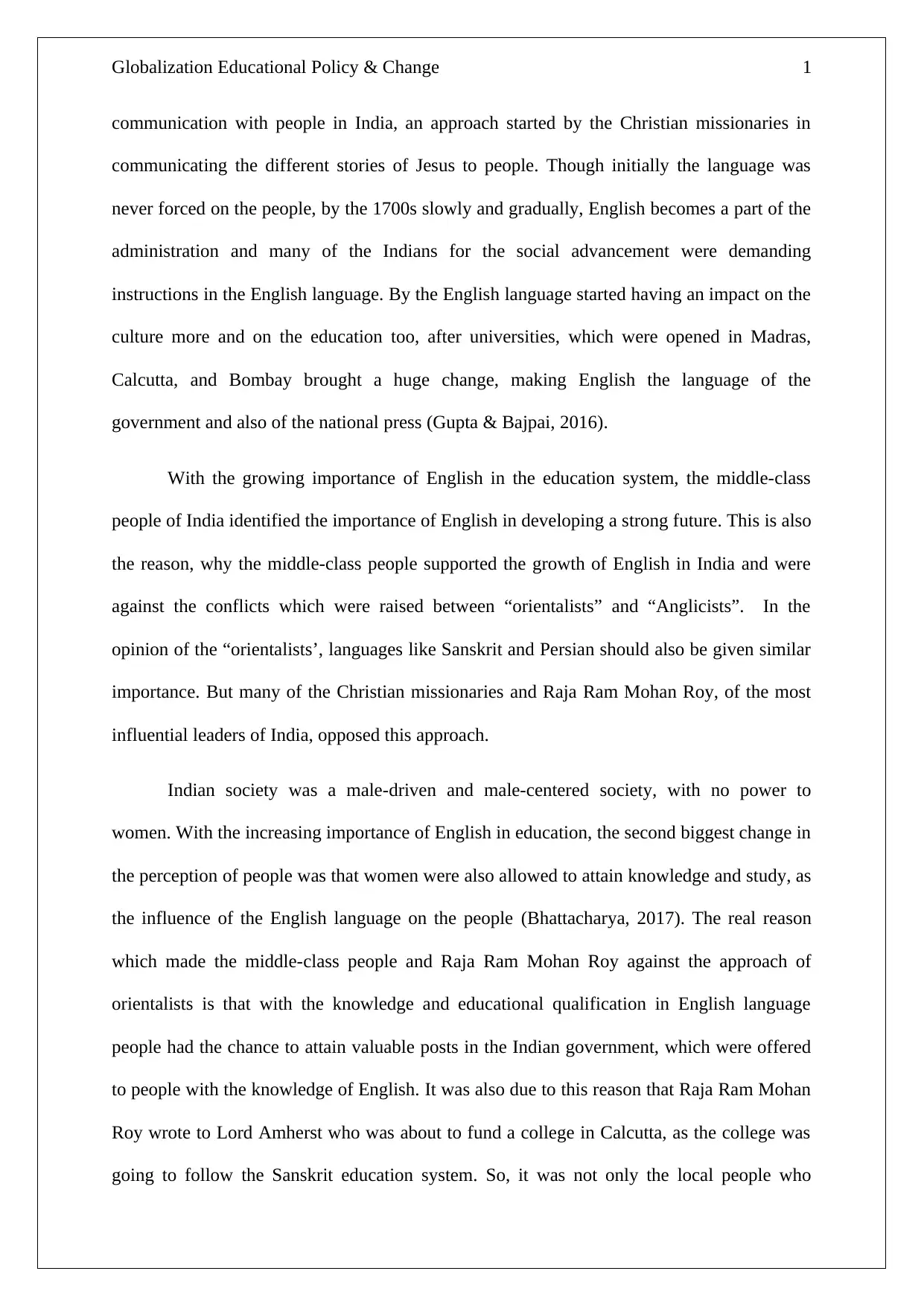
Globalization Educational Policy & Change 1
communication with people in India, an approach started by the Christian missionaries in
communicating the different stories of Jesus to people. Though initially the language was
never forced on the people, by the 1700s slowly and gradually, English becomes a part of the
administration and many of the Indians for the social advancement were demanding
instructions in the English language. By the English language started having an impact on the
culture more and on the education too, after universities, which were opened in Madras,
Calcutta, and Bombay brought a huge change, making English the language of the
government and also of the national press (Gupta & Bajpai, 2016).
With the growing importance of English in the education system, the middle-class
people of India identified the importance of English in developing a strong future. This is also
the reason, why the middle-class people supported the growth of English in India and were
against the conflicts which were raised between “orientalists” and “Anglicists”. In the
opinion of the “orientalists’, languages like Sanskrit and Persian should also be given similar
importance. But many of the Christian missionaries and Raja Ram Mohan Roy, of the most
influential leaders of India, opposed this approach.
Indian society was a male-driven and male-centered society, with no power to
women. With the increasing importance of English in education, the second biggest change in
the perception of people was that women were also allowed to attain knowledge and study, as
the influence of the English language on the people (Bhattacharya, 2017). The real reason
which made the middle-class people and Raja Ram Mohan Roy against the approach of
orientalists is that with the knowledge and educational qualification in English language
people had the chance to attain valuable posts in the Indian government, which were offered
to people with the knowledge of English. It was also due to this reason that Raja Ram Mohan
Roy wrote to Lord Amherst who was about to fund a college in Calcutta, as the college was
going to follow the Sanskrit education system. So, it was not only the local people who
communication with people in India, an approach started by the Christian missionaries in
communicating the different stories of Jesus to people. Though initially the language was
never forced on the people, by the 1700s slowly and gradually, English becomes a part of the
administration and many of the Indians for the social advancement were demanding
instructions in the English language. By the English language started having an impact on the
culture more and on the education too, after universities, which were opened in Madras,
Calcutta, and Bombay brought a huge change, making English the language of the
government and also of the national press (Gupta & Bajpai, 2016).
With the growing importance of English in the education system, the middle-class
people of India identified the importance of English in developing a strong future. This is also
the reason, why the middle-class people supported the growth of English in India and were
against the conflicts which were raised between “orientalists” and “Anglicists”. In the
opinion of the “orientalists’, languages like Sanskrit and Persian should also be given similar
importance. But many of the Christian missionaries and Raja Ram Mohan Roy, of the most
influential leaders of India, opposed this approach.
Indian society was a male-driven and male-centered society, with no power to
women. With the increasing importance of English in education, the second biggest change in
the perception of people was that women were also allowed to attain knowledge and study, as
the influence of the English language on the people (Bhattacharya, 2017). The real reason
which made the middle-class people and Raja Ram Mohan Roy against the approach of
orientalists is that with the knowledge and educational qualification in English language
people had the chance to attain valuable posts in the Indian government, which were offered
to people with the knowledge of English. It was also due to this reason that Raja Ram Mohan
Roy wrote to Lord Amherst who was about to fund a college in Calcutta, as the college was
going to follow the Sanskrit education system. So, it was not only the local people who
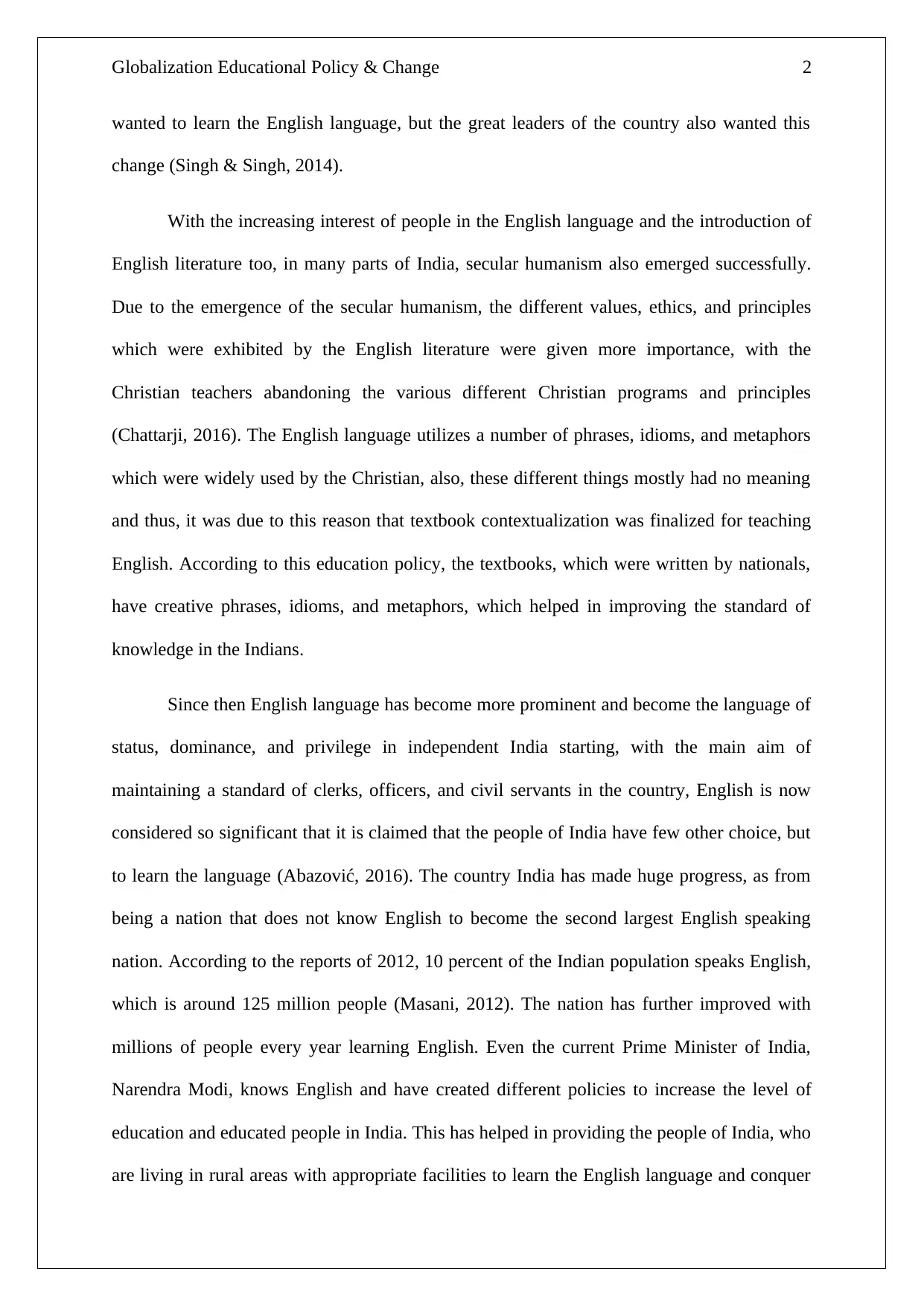
Globalization Educational Policy & Change 2
wanted to learn the English language, but the great leaders of the country also wanted this
change (Singh & Singh, 2014).
With the increasing interest of people in the English language and the introduction of
English literature too, in many parts of India, secular humanism also emerged successfully.
Due to the emergence of the secular humanism, the different values, ethics, and principles
which were exhibited by the English literature were given more importance, with the
Christian teachers abandoning the various different Christian programs and principles
(Chattarji, 2016). The English language utilizes a number of phrases, idioms, and metaphors
which were widely used by the Christian, also, these different things mostly had no meaning
and thus, it was due to this reason that textbook contextualization was finalized for teaching
English. According to this education policy, the textbooks, which were written by nationals,
have creative phrases, idioms, and metaphors, which helped in improving the standard of
knowledge in the Indians.
Since then English language has become more prominent and become the language of
status, dominance, and privilege in independent India starting, with the main aim of
maintaining a standard of clerks, officers, and civil servants in the country, English is now
considered so significant that it is claimed that the people of India have few other choice, but
to learn the language (Abazović, 2016). The country India has made huge progress, as from
being a nation that does not know English to become the second largest English speaking
nation. According to the reports of 2012, 10 percent of the Indian population speaks English,
which is around 125 million people (Masani, 2012). The nation has further improved with
millions of people every year learning English. Even the current Prime Minister of India,
Narendra Modi, knows English and have created different policies to increase the level of
education and educated people in India. This has helped in providing the people of India, who
are living in rural areas with appropriate facilities to learn the English language and conquer
wanted to learn the English language, but the great leaders of the country also wanted this
change (Singh & Singh, 2014).
With the increasing interest of people in the English language and the introduction of
English literature too, in many parts of India, secular humanism also emerged successfully.
Due to the emergence of the secular humanism, the different values, ethics, and principles
which were exhibited by the English literature were given more importance, with the
Christian teachers abandoning the various different Christian programs and principles
(Chattarji, 2016). The English language utilizes a number of phrases, idioms, and metaphors
which were widely used by the Christian, also, these different things mostly had no meaning
and thus, it was due to this reason that textbook contextualization was finalized for teaching
English. According to this education policy, the textbooks, which were written by nationals,
have creative phrases, idioms, and metaphors, which helped in improving the standard of
knowledge in the Indians.
Since then English language has become more prominent and become the language of
status, dominance, and privilege in independent India starting, with the main aim of
maintaining a standard of clerks, officers, and civil servants in the country, English is now
considered so significant that it is claimed that the people of India have few other choice, but
to learn the language (Abazović, 2016). The country India has made huge progress, as from
being a nation that does not know English to become the second largest English speaking
nation. According to the reports of 2012, 10 percent of the Indian population speaks English,
which is around 125 million people (Masani, 2012). The nation has further improved with
millions of people every year learning English. Even the current Prime Minister of India,
Narendra Modi, knows English and have created different policies to increase the level of
education and educated people in India. This has helped in providing the people of India, who
are living in rural areas with appropriate facilities to learn the English language and conquer
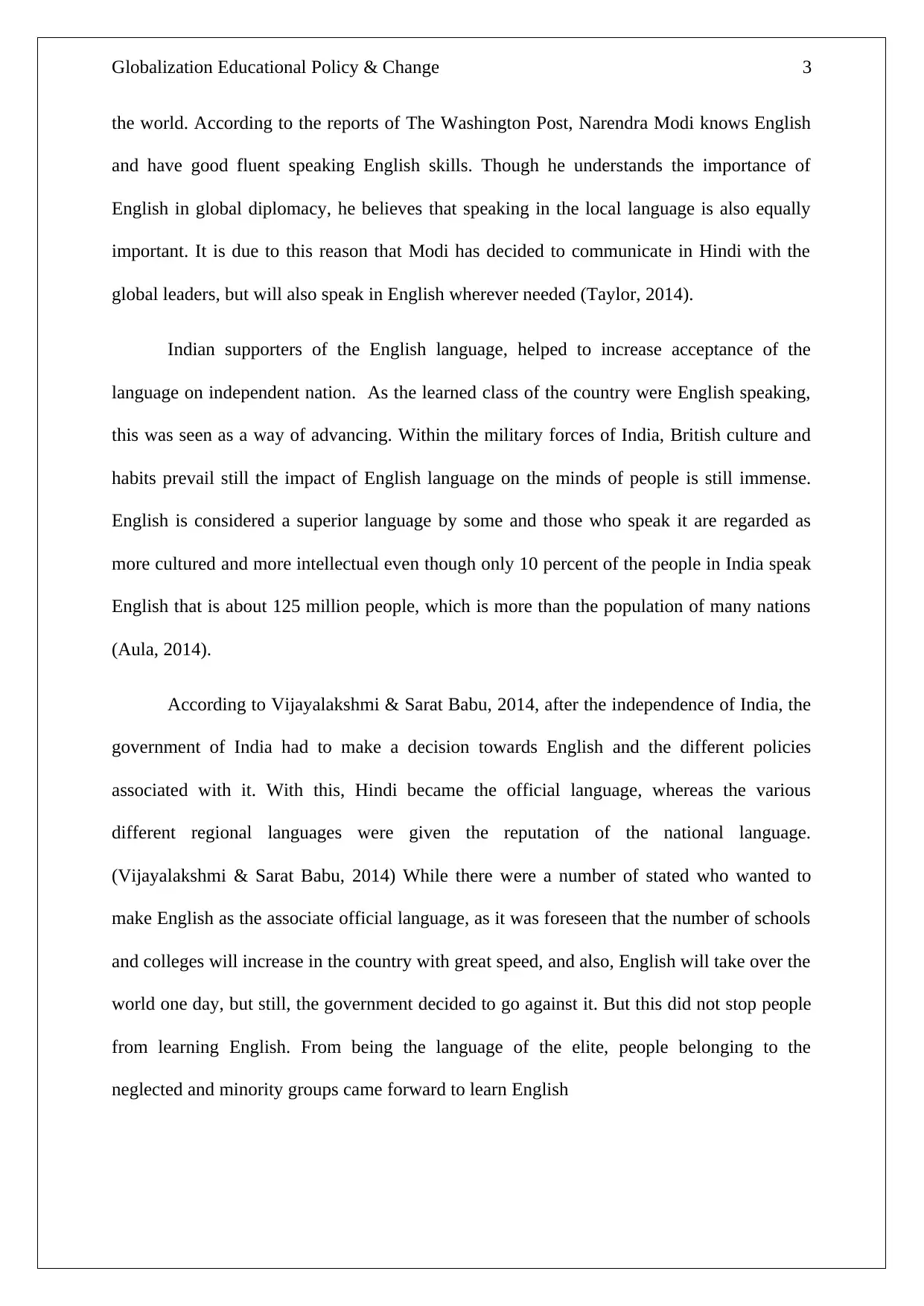
Globalization Educational Policy & Change 3
the world. According to the reports of The Washington Post, Narendra Modi knows English
and have good fluent speaking English skills. Though he understands the importance of
English in global diplomacy, he believes that speaking in the local language is also equally
important. It is due to this reason that Modi has decided to communicate in Hindi with the
global leaders, but will also speak in English wherever needed (Taylor, 2014).
Indian supporters of the English language, helped to increase acceptance of the
language on independent nation. As the learned class of the country were English speaking,
this was seen as a way of advancing. Within the military forces of India, British culture and
habits prevail still the impact of English language on the minds of people is still immense.
English is considered a superior language by some and those who speak it are regarded as
more cultured and more intellectual even though only 10 percent of the people in India speak
English that is about 125 million people, which is more than the population of many nations
(Aula, 2014).
According to Vijayalakshmi & Sarat Babu, 2014, after the independence of India, the
government of India had to make a decision towards English and the different policies
associated with it. With this, Hindi became the official language, whereas the various
different regional languages were given the reputation of the national language.
(Vijayalakshmi & Sarat Babu, 2014) While there were a number of stated who wanted to
make English as the associate official language, as it was foreseen that the number of schools
and colleges will increase in the country with great speed, and also, English will take over the
world one day, but still, the government decided to go against it. But this did not stop people
from learning English. From being the language of the elite, people belonging to the
neglected and minority groups came forward to learn English
the world. According to the reports of The Washington Post, Narendra Modi knows English
and have good fluent speaking English skills. Though he understands the importance of
English in global diplomacy, he believes that speaking in the local language is also equally
important. It is due to this reason that Modi has decided to communicate in Hindi with the
global leaders, but will also speak in English wherever needed (Taylor, 2014).
Indian supporters of the English language, helped to increase acceptance of the
language on independent nation. As the learned class of the country were English speaking,
this was seen as a way of advancing. Within the military forces of India, British culture and
habits prevail still the impact of English language on the minds of people is still immense.
English is considered a superior language by some and those who speak it are regarded as
more cultured and more intellectual even though only 10 percent of the people in India speak
English that is about 125 million people, which is more than the population of many nations
(Aula, 2014).
According to Vijayalakshmi & Sarat Babu, 2014, after the independence of India, the
government of India had to make a decision towards English and the different policies
associated with it. With this, Hindi became the official language, whereas the various
different regional languages were given the reputation of the national language.
(Vijayalakshmi & Sarat Babu, 2014) While there were a number of stated who wanted to
make English as the associate official language, as it was foreseen that the number of schools
and colleges will increase in the country with great speed, and also, English will take over the
world one day, but still, the government decided to go against it. But this did not stop people
from learning English. From being the language of the elite, people belonging to the
neglected and minority groups came forward to learn English
Secure Best Marks with AI Grader
Need help grading? Try our AI Grader for instant feedback on your assignments.
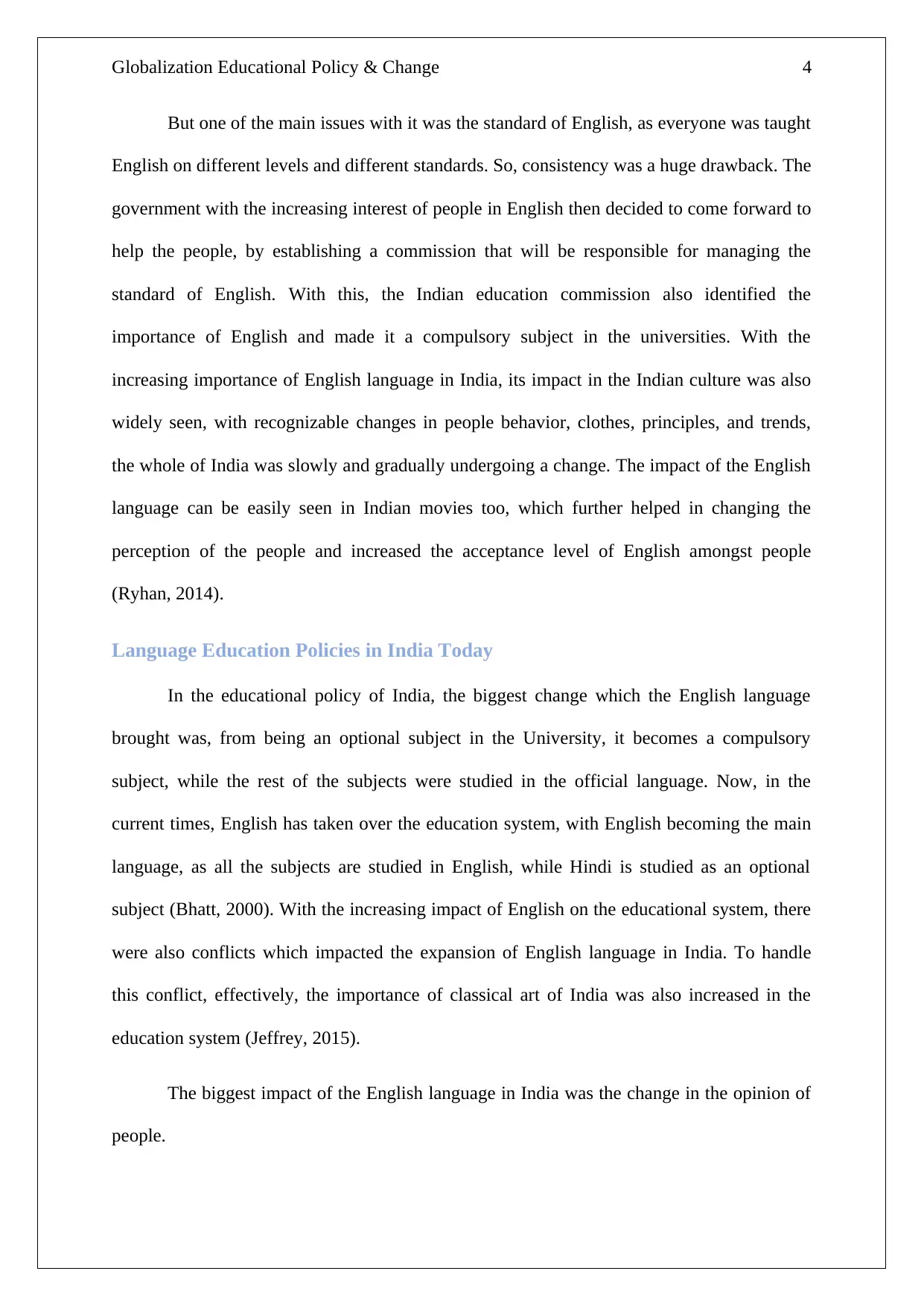
Globalization Educational Policy & Change 4
But one of the main issues with it was the standard of English, as everyone was taught
English on different levels and different standards. So, consistency was a huge drawback. The
government with the increasing interest of people in English then decided to come forward to
help the people, by establishing a commission that will be responsible for managing the
standard of English. With this, the Indian education commission also identified the
importance of English and made it a compulsory subject in the universities. With the
increasing importance of English language in India, its impact in the Indian culture was also
widely seen, with recognizable changes in people behavior, clothes, principles, and trends,
the whole of India was slowly and gradually undergoing a change. The impact of the English
language can be easily seen in Indian movies too, which further helped in changing the
perception of the people and increased the acceptance level of English amongst people
(Ryhan, 2014).
Language Education Policies in India Today
In the educational policy of India, the biggest change which the English language
brought was, from being an optional subject in the University, it becomes a compulsory
subject, while the rest of the subjects were studied in the official language. Now, in the
current times, English has taken over the education system, with English becoming the main
language, as all the subjects are studied in English, while Hindi is studied as an optional
subject (Bhatt, 2000). With the increasing impact of English on the educational system, there
were also conflicts which impacted the expansion of English language in India. To handle
this conflict, effectively, the importance of classical art of India was also increased in the
education system (Jeffrey, 2015).
The biggest impact of the English language in India was the change in the opinion of
people.
But one of the main issues with it was the standard of English, as everyone was taught
English on different levels and different standards. So, consistency was a huge drawback. The
government with the increasing interest of people in English then decided to come forward to
help the people, by establishing a commission that will be responsible for managing the
standard of English. With this, the Indian education commission also identified the
importance of English and made it a compulsory subject in the universities. With the
increasing importance of English language in India, its impact in the Indian culture was also
widely seen, with recognizable changes in people behavior, clothes, principles, and trends,
the whole of India was slowly and gradually undergoing a change. The impact of the English
language can be easily seen in Indian movies too, which further helped in changing the
perception of the people and increased the acceptance level of English amongst people
(Ryhan, 2014).
Language Education Policies in India Today
In the educational policy of India, the biggest change which the English language
brought was, from being an optional subject in the University, it becomes a compulsory
subject, while the rest of the subjects were studied in the official language. Now, in the
current times, English has taken over the education system, with English becoming the main
language, as all the subjects are studied in English, while Hindi is studied as an optional
subject (Bhatt, 2000). With the increasing impact of English on the educational system, there
were also conflicts which impacted the expansion of English language in India. To handle
this conflict, effectively, the importance of classical art of India was also increased in the
education system (Jeffrey, 2015).
The biggest impact of the English language in India was the change in the opinion of
people.
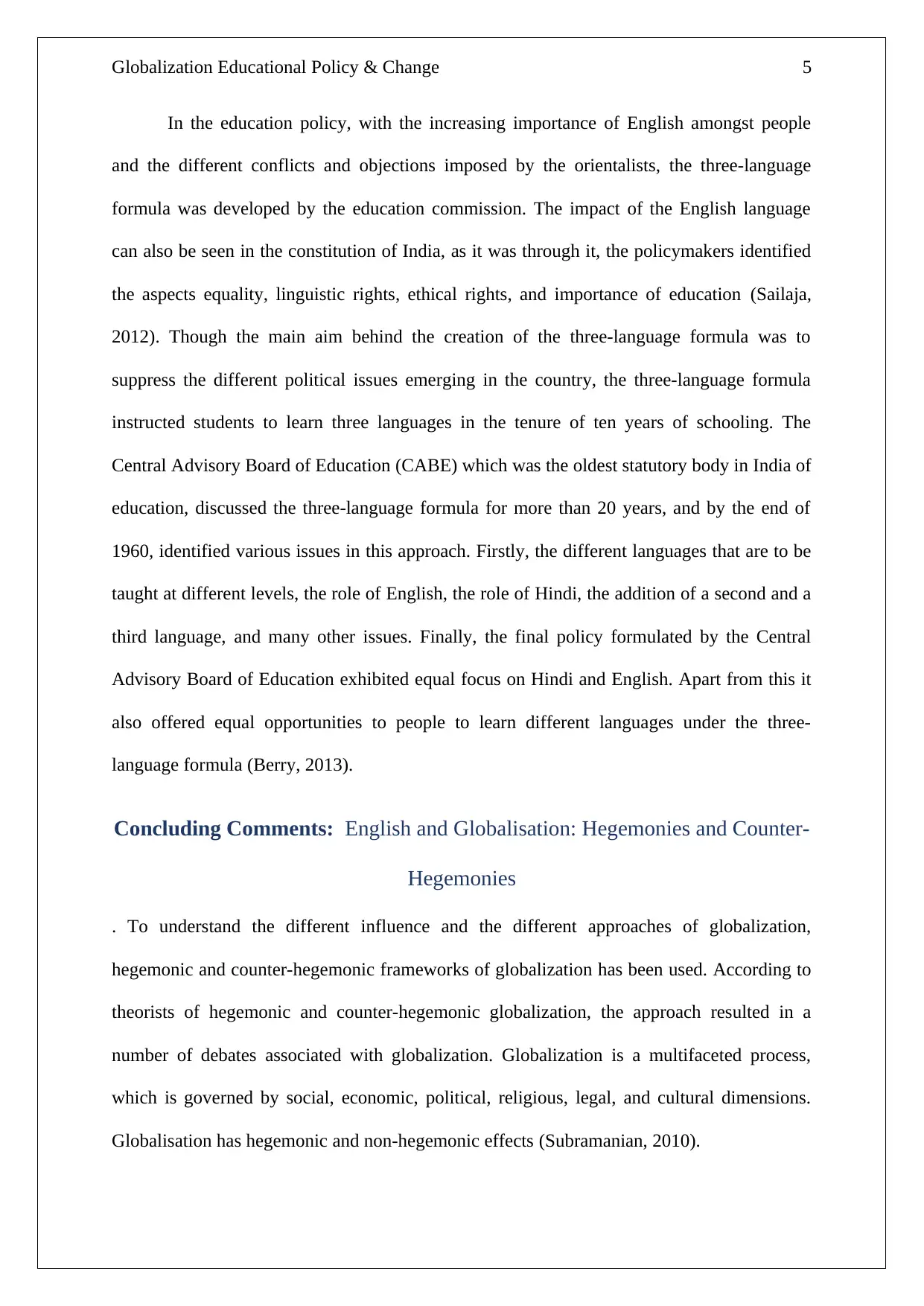
Globalization Educational Policy & Change 5
In the education policy, with the increasing importance of English amongst people
and the different conflicts and objections imposed by the orientalists, the three-language
formula was developed by the education commission. The impact of the English language
can also be seen in the constitution of India, as it was through it, the policymakers identified
the aspects equality, linguistic rights, ethical rights, and importance of education (Sailaja,
2012). Though the main aim behind the creation of the three-language formula was to
suppress the different political issues emerging in the country, the three-language formula
instructed students to learn three languages in the tenure of ten years of schooling. The
Central Advisory Board of Education (CABE) which was the oldest statutory body in India of
education, discussed the three-language formula for more than 20 years, and by the end of
1960, identified various issues in this approach. Firstly, the different languages that are to be
taught at different levels, the role of English, the role of Hindi, the addition of a second and a
third language, and many other issues. Finally, the final policy formulated by the Central
Advisory Board of Education exhibited equal focus on Hindi and English. Apart from this it
also offered equal opportunities to people to learn different languages under the three-
language formula (Berry, 2013).
Concluding Comments: English and Globalisation: Hegemonies and Counter-
Hegemonies
. To understand the different influence and the different approaches of globalization,
hegemonic and counter-hegemonic frameworks of globalization has been used. According to
theorists of hegemonic and counter-hegemonic globalization, the approach resulted in a
number of debates associated with globalization. Globalization is a multifaceted process,
which is governed by social, economic, political, religious, legal, and cultural dimensions.
Globalisation has hegemonic and non-hegemonic effects (Subramanian, 2010).
In the education policy, with the increasing importance of English amongst people
and the different conflicts and objections imposed by the orientalists, the three-language
formula was developed by the education commission. The impact of the English language
can also be seen in the constitution of India, as it was through it, the policymakers identified
the aspects equality, linguistic rights, ethical rights, and importance of education (Sailaja,
2012). Though the main aim behind the creation of the three-language formula was to
suppress the different political issues emerging in the country, the three-language formula
instructed students to learn three languages in the tenure of ten years of schooling. The
Central Advisory Board of Education (CABE) which was the oldest statutory body in India of
education, discussed the three-language formula for more than 20 years, and by the end of
1960, identified various issues in this approach. Firstly, the different languages that are to be
taught at different levels, the role of English, the role of Hindi, the addition of a second and a
third language, and many other issues. Finally, the final policy formulated by the Central
Advisory Board of Education exhibited equal focus on Hindi and English. Apart from this it
also offered equal opportunities to people to learn different languages under the three-
language formula (Berry, 2013).
Concluding Comments: English and Globalisation: Hegemonies and Counter-
Hegemonies
. To understand the different influence and the different approaches of globalization,
hegemonic and counter-hegemonic frameworks of globalization has been used. According to
theorists of hegemonic and counter-hegemonic globalization, the approach resulted in a
number of debates associated with globalization. Globalization is a multifaceted process,
which is governed by social, economic, political, religious, legal, and cultural dimensions.
Globalisation has hegemonic and non-hegemonic effects (Subramanian, 2010).
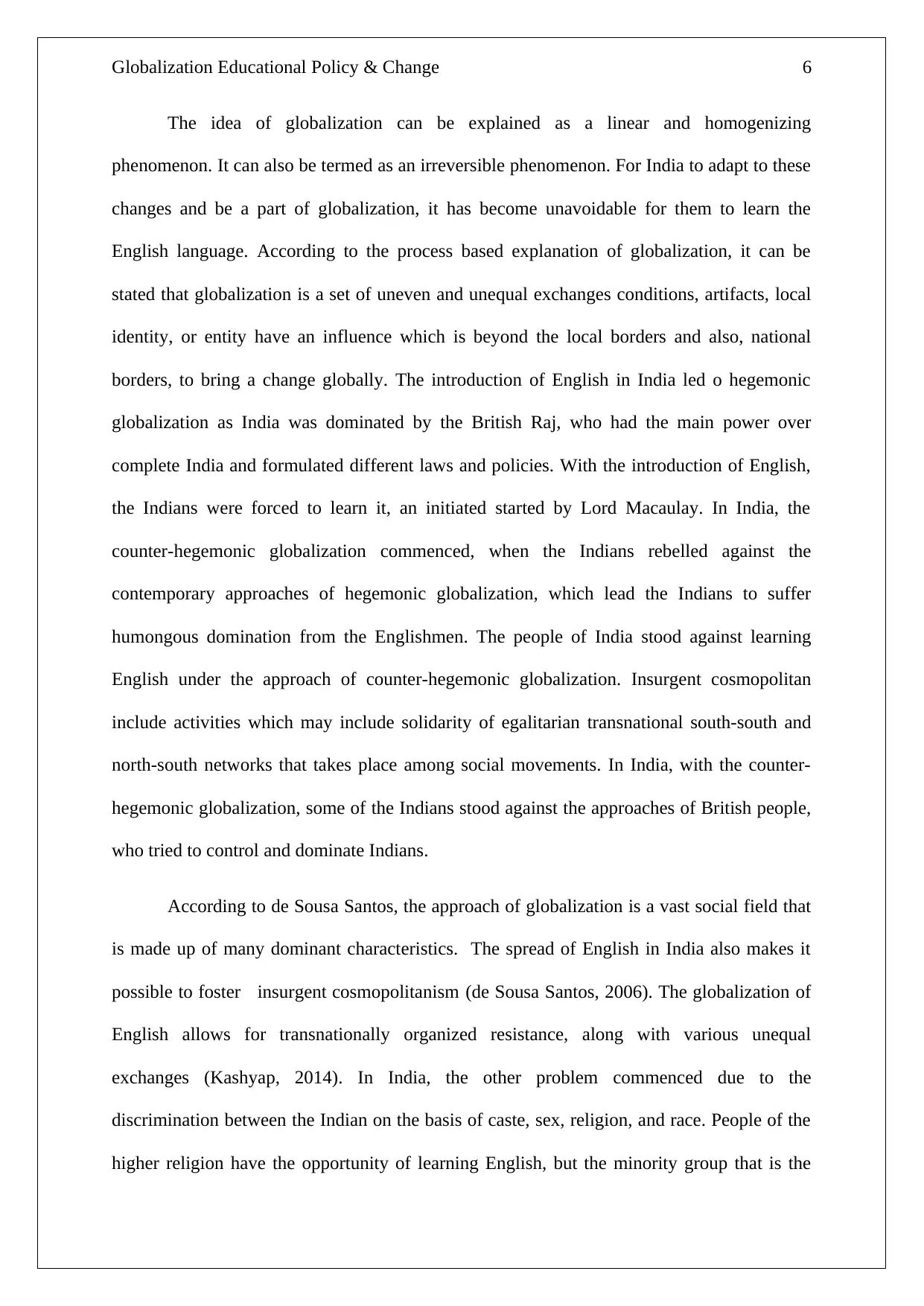
Globalization Educational Policy & Change 6
The idea of globalization can be explained as a linear and homogenizing
phenomenon. It can also be termed as an irreversible phenomenon. For India to adapt to these
changes and be a part of globalization, it has become unavoidable for them to learn the
English language. According to the process based explanation of globalization, it can be
stated that globalization is a set of uneven and unequal exchanges conditions, artifacts, local
identity, or entity have an influence which is beyond the local borders and also, national
borders, to bring a change globally. The introduction of English in India led o hegemonic
globalization as India was dominated by the British Raj, who had the main power over
complete India and formulated different laws and policies. With the introduction of English,
the Indians were forced to learn it, an initiated started by Lord Macaulay. In India, the
counter-hegemonic globalization commenced, when the Indians rebelled against the
contemporary approaches of hegemonic globalization, which lead the Indians to suffer
humongous domination from the Englishmen. The people of India stood against learning
English under the approach of counter-hegemonic globalization. Insurgent cosmopolitan
include activities which may include solidarity of egalitarian transnational south-south and
north-south networks that takes place among social movements. In India, with the counter-
hegemonic globalization, some of the Indians stood against the approaches of British people,
who tried to control and dominate Indians.
According to de Sousa Santos, the approach of globalization is a vast social field that
is made up of many dominant characteristics. The spread of English in India also makes it
possible to foster insurgent cosmopolitanism (de Sousa Santos, 2006). The globalization of
English allows for transnationally organized resistance, along with various unequal
exchanges (Kashyap, 2014). In India, the other problem commenced due to the
discrimination between the Indian on the basis of caste, sex, religion, and race. People of the
higher religion have the opportunity of learning English, but the minority group that is the
The idea of globalization can be explained as a linear and homogenizing
phenomenon. It can also be termed as an irreversible phenomenon. For India to adapt to these
changes and be a part of globalization, it has become unavoidable for them to learn the
English language. According to the process based explanation of globalization, it can be
stated that globalization is a set of uneven and unequal exchanges conditions, artifacts, local
identity, or entity have an influence which is beyond the local borders and also, national
borders, to bring a change globally. The introduction of English in India led o hegemonic
globalization as India was dominated by the British Raj, who had the main power over
complete India and formulated different laws and policies. With the introduction of English,
the Indians were forced to learn it, an initiated started by Lord Macaulay. In India, the
counter-hegemonic globalization commenced, when the Indians rebelled against the
contemporary approaches of hegemonic globalization, which lead the Indians to suffer
humongous domination from the Englishmen. The people of India stood against learning
English under the approach of counter-hegemonic globalization. Insurgent cosmopolitan
include activities which may include solidarity of egalitarian transnational south-south and
north-south networks that takes place among social movements. In India, with the counter-
hegemonic globalization, some of the Indians stood against the approaches of British people,
who tried to control and dominate Indians.
According to de Sousa Santos, the approach of globalization is a vast social field that
is made up of many dominant characteristics. The spread of English in India also makes it
possible to foster insurgent cosmopolitanism (de Sousa Santos, 2006). The globalization of
English allows for transnationally organized resistance, along with various unequal
exchanges (Kashyap, 2014). In India, the other problem commenced due to the
discrimination between the Indian on the basis of caste, sex, religion, and race. People of the
higher religion have the opportunity of learning English, but the minority group that is the
Paraphrase This Document
Need a fresh take? Get an instant paraphrase of this document with our AI Paraphraser
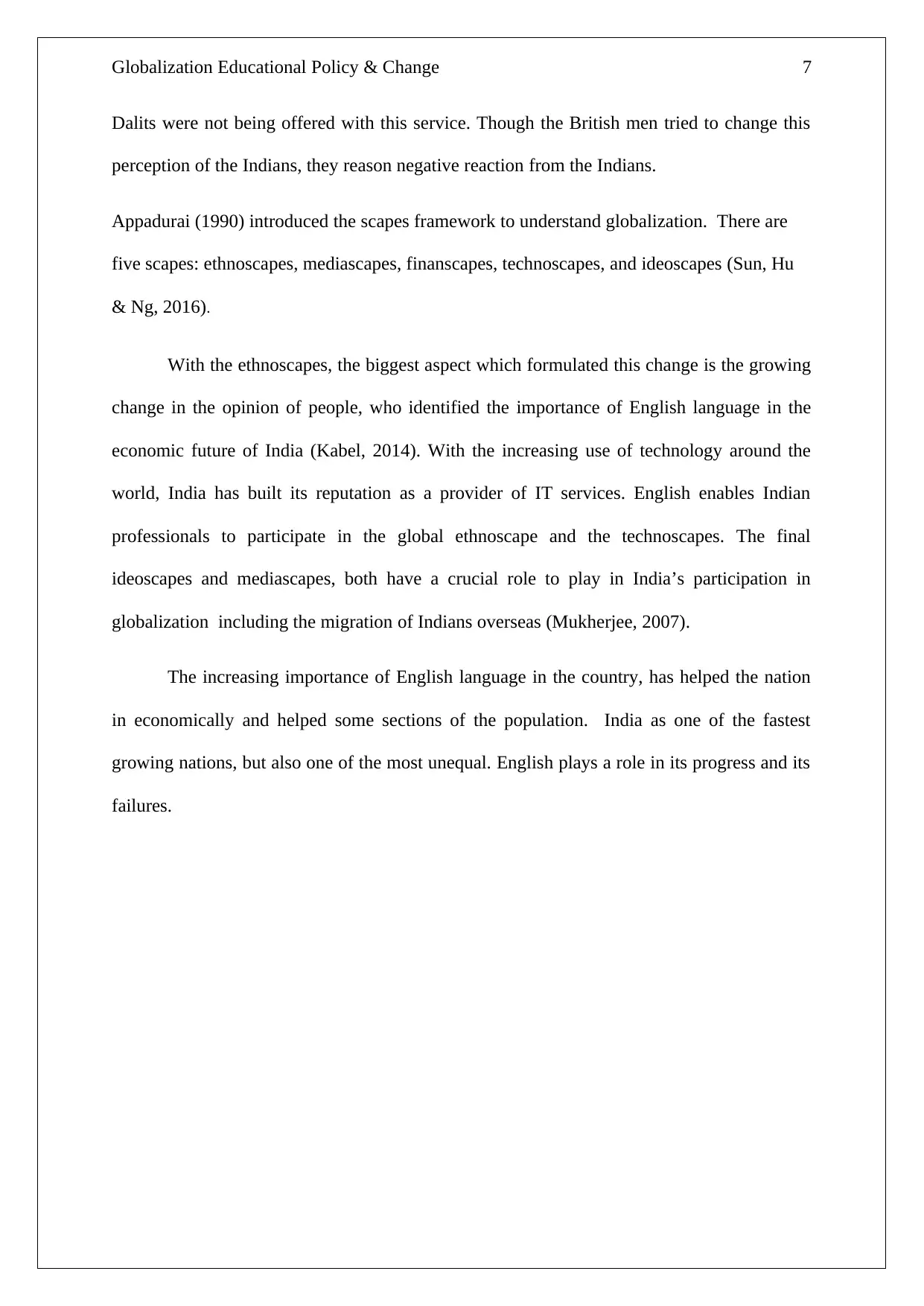
Globalization Educational Policy & Change 7
Dalits were not being offered with this service. Though the British men tried to change this
perception of the Indians, they reason negative reaction from the Indians.
Appadurai (1990) introduced the scapes framework to understand globalization. There are
five scapes: ethnoscapes, mediascapes, finanscapes, technoscapes, and ideoscapes (Sun, Hu
& Ng, 2016).
With the ethnoscapes, the biggest aspect which formulated this change is the growing
change in the opinion of people, who identified the importance of English language in the
economic future of India (Kabel, 2014). With the increasing use of technology around the
world, India has built its reputation as a provider of IT services. English enables Indian
professionals to participate in the global ethnoscape and the technoscapes. The final
ideoscapes and mediascapes, both have a crucial role to play in India’s participation in
globalization including the migration of Indians overseas (Mukherjee, 2007).
The increasing importance of English language in the country, has helped the nation
in economically and helped some sections of the population. India as one of the fastest
growing nations, but also one of the most unequal. English plays a role in its progress and its
failures.
Dalits were not being offered with this service. Though the British men tried to change this
perception of the Indians, they reason negative reaction from the Indians.
Appadurai (1990) introduced the scapes framework to understand globalization. There are
five scapes: ethnoscapes, mediascapes, finanscapes, technoscapes, and ideoscapes (Sun, Hu
& Ng, 2016).
With the ethnoscapes, the biggest aspect which formulated this change is the growing
change in the opinion of people, who identified the importance of English language in the
economic future of India (Kabel, 2014). With the increasing use of technology around the
world, India has built its reputation as a provider of IT services. English enables Indian
professionals to participate in the global ethnoscape and the technoscapes. The final
ideoscapes and mediascapes, both have a crucial role to play in India’s participation in
globalization including the migration of Indians overseas (Mukherjee, 2007).
The increasing importance of English language in the country, has helped the nation
in economically and helped some sections of the population. India as one of the fastest
growing nations, but also one of the most unequal. English plays a role in its progress and its
failures.
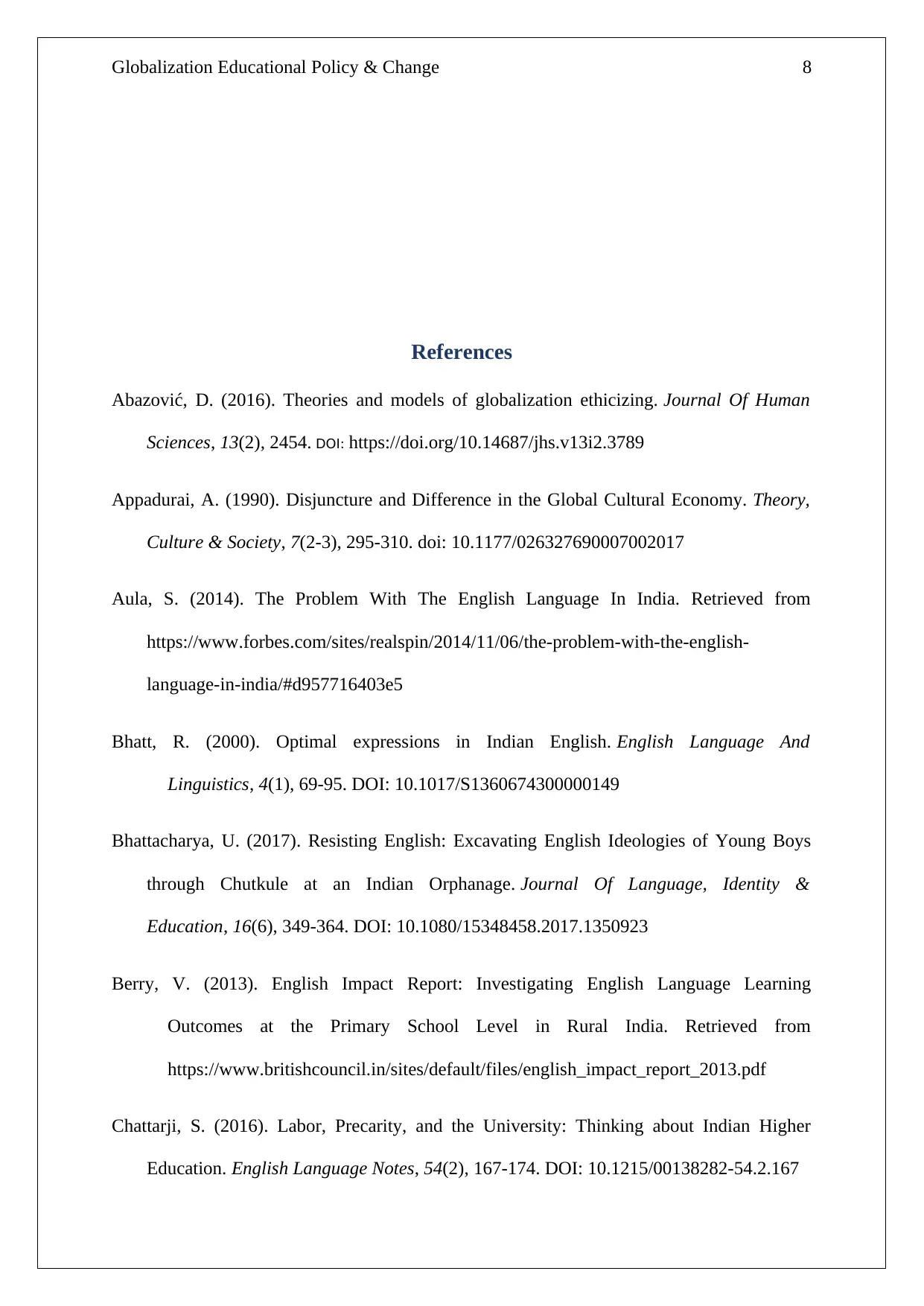
Globalization Educational Policy & Change 8
References
Abazović, D. (2016). Theories and models of globalization ethicizing. Journal Of Human
Sciences, 13(2), 2454. DOI: https://doi.org/10.14687/jhs.v13i2.3789
Appadurai, A. (1990). Disjuncture and Difference in the Global Cultural Economy. Theory,
Culture & Society, 7(2-3), 295-310. doi: 10.1177/026327690007002017
Aula, S. (2014). The Problem With The English Language In India. Retrieved from
https://www.forbes.com/sites/realspin/2014/11/06/the-problem-with-the-english-
language-in-india/#d957716403e5
Bhatt, R. (2000). Optimal expressions in Indian English. English Language And
Linguistics, 4(1), 69-95. DOI: 10.1017/S1360674300000149
Bhattacharya, U. (2017). Resisting English: Excavating English Ideologies of Young Boys
through Chutkule at an Indian Orphanage. Journal Of Language, Identity &
Education, 16(6), 349-364. DOI: 10.1080/15348458.2017.1350923
Berry, V. (2013). English Impact Report: Investigating English Language Learning
Outcomes at the Primary School Level in Rural India. Retrieved from
https://www.britishcouncil.in/sites/default/files/english_impact_report_2013.pdf
Chattarji, S. (2016). Labor, Precarity, and the University: Thinking about Indian Higher
Education. English Language Notes, 54(2), 167-174. DOI: 10.1215/00138282-54.2.167
References
Abazović, D. (2016). Theories and models of globalization ethicizing. Journal Of Human
Sciences, 13(2), 2454. DOI: https://doi.org/10.14687/jhs.v13i2.3789
Appadurai, A. (1990). Disjuncture and Difference in the Global Cultural Economy. Theory,
Culture & Society, 7(2-3), 295-310. doi: 10.1177/026327690007002017
Aula, S. (2014). The Problem With The English Language In India. Retrieved from
https://www.forbes.com/sites/realspin/2014/11/06/the-problem-with-the-english-
language-in-india/#d957716403e5
Bhatt, R. (2000). Optimal expressions in Indian English. English Language And
Linguistics, 4(1), 69-95. DOI: 10.1017/S1360674300000149
Bhattacharya, U. (2017). Resisting English: Excavating English Ideologies of Young Boys
through Chutkule at an Indian Orphanage. Journal Of Language, Identity &
Education, 16(6), 349-364. DOI: 10.1080/15348458.2017.1350923
Berry, V. (2013). English Impact Report: Investigating English Language Learning
Outcomes at the Primary School Level in Rural India. Retrieved from
https://www.britishcouncil.in/sites/default/files/english_impact_report_2013.pdf
Chattarji, S. (2016). Labor, Precarity, and the University: Thinking about Indian Higher
Education. English Language Notes, 54(2), 167-174. DOI: 10.1215/00138282-54.2.167
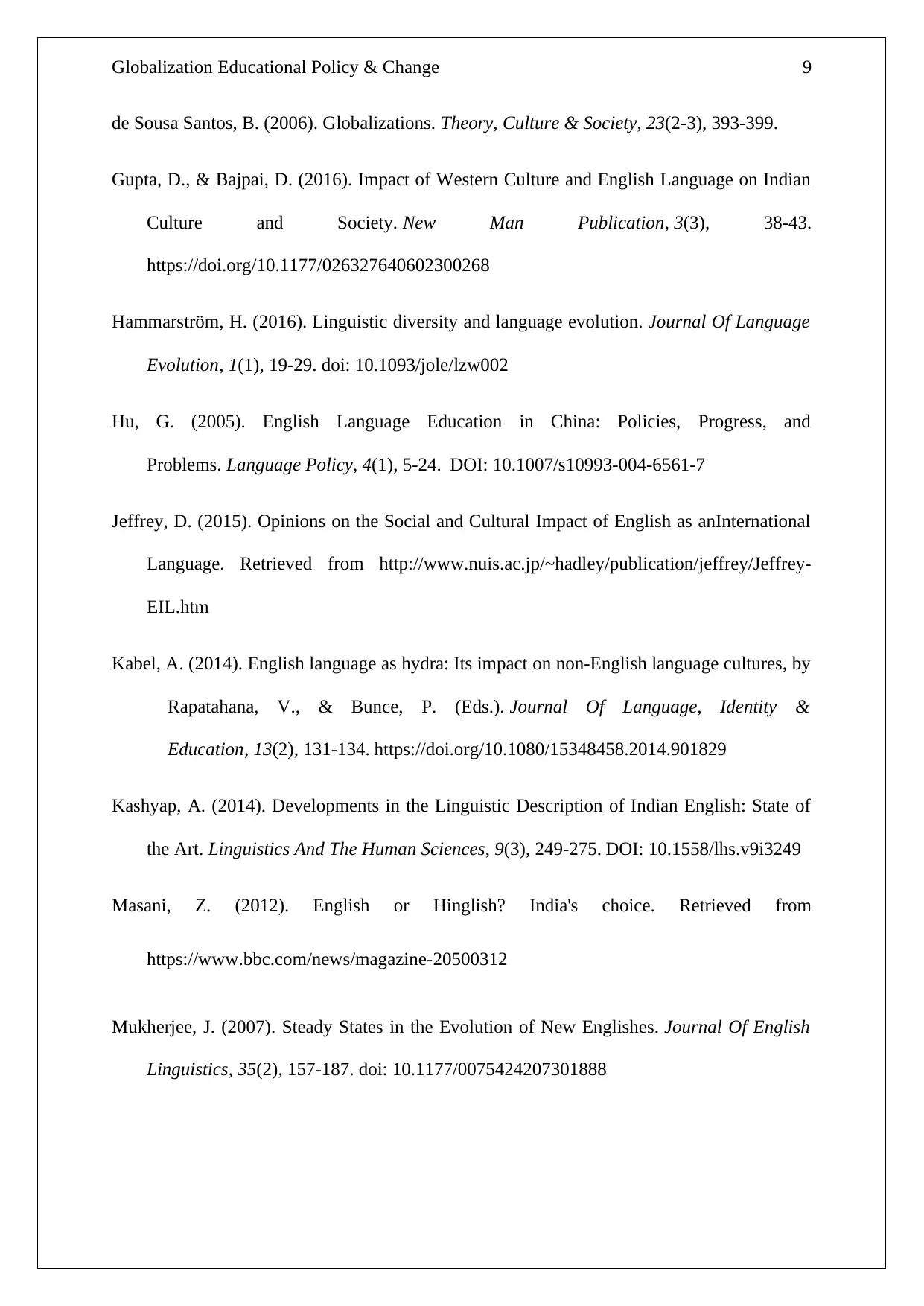
Globalization Educational Policy & Change 9
de Sousa Santos, B. (2006). Globalizations. Theory, Culture & Society, 23(2-3), 393-399.
Gupta, D., & Bajpai, D. (2016). Impact of Western Culture and English Language on Indian
Culture and Society. New Man Publication, 3(3), 38-43.
https://doi.org/10.1177/026327640602300268
Hammarström, H. (2016). Linguistic diversity and language evolution. Journal Of Language
Evolution, 1(1), 19-29. doi: 10.1093/jole/lzw002
Hu, G. (2005). English Language Education in China: Policies, Progress, and
Problems. Language Policy, 4(1), 5-24. DOI: 10.1007/s10993-004-6561-7
Jeffrey, D. (2015). Opinions on the Social and Cultural Impact of English as anInternational
Language. Retrieved from http://www.nuis.ac.jp/~hadley/publication/jeffrey/Jeffrey-
EIL.htm
Kabel, A. (2014). English language as hydra: Its impact on non-English language cultures, by
Rapatahana, V., & Bunce, P. (Eds.). Journal Of Language, Identity &
Education, 13(2), 131-134. https://doi.org/10.1080/15348458.2014.901829
Kashyap, A. (2014). Developments in the Linguistic Description of Indian English: State of
the Art. Linguistics And The Human Sciences, 9(3), 249-275. DOI: 10.1558/lhs.v9i3249
Masani, Z. (2012). English or Hinglish? India's choice. Retrieved from
https://www.bbc.com/news/magazine-20500312
Mukherjee, J. (2007). Steady States in the Evolution of New Englishes. Journal Of English
Linguistics, 35(2), 157-187. doi: 10.1177/0075424207301888
de Sousa Santos, B. (2006). Globalizations. Theory, Culture & Society, 23(2-3), 393-399.
Gupta, D., & Bajpai, D. (2016). Impact of Western Culture and English Language on Indian
Culture and Society. New Man Publication, 3(3), 38-43.
https://doi.org/10.1177/026327640602300268
Hammarström, H. (2016). Linguistic diversity and language evolution. Journal Of Language
Evolution, 1(1), 19-29. doi: 10.1093/jole/lzw002
Hu, G. (2005). English Language Education in China: Policies, Progress, and
Problems. Language Policy, 4(1), 5-24. DOI: 10.1007/s10993-004-6561-7
Jeffrey, D. (2015). Opinions on the Social and Cultural Impact of English as anInternational
Language. Retrieved from http://www.nuis.ac.jp/~hadley/publication/jeffrey/Jeffrey-
EIL.htm
Kabel, A. (2014). English language as hydra: Its impact on non-English language cultures, by
Rapatahana, V., & Bunce, P. (Eds.). Journal Of Language, Identity &
Education, 13(2), 131-134. https://doi.org/10.1080/15348458.2014.901829
Kashyap, A. (2014). Developments in the Linguistic Description of Indian English: State of
the Art. Linguistics And The Human Sciences, 9(3), 249-275. DOI: 10.1558/lhs.v9i3249
Masani, Z. (2012). English or Hinglish? India's choice. Retrieved from
https://www.bbc.com/news/magazine-20500312
Mukherjee, J. (2007). Steady States in the Evolution of New Englishes. Journal Of English
Linguistics, 35(2), 157-187. doi: 10.1177/0075424207301888
Secure Best Marks with AI Grader
Need help grading? Try our AI Grader for instant feedback on your assignments.
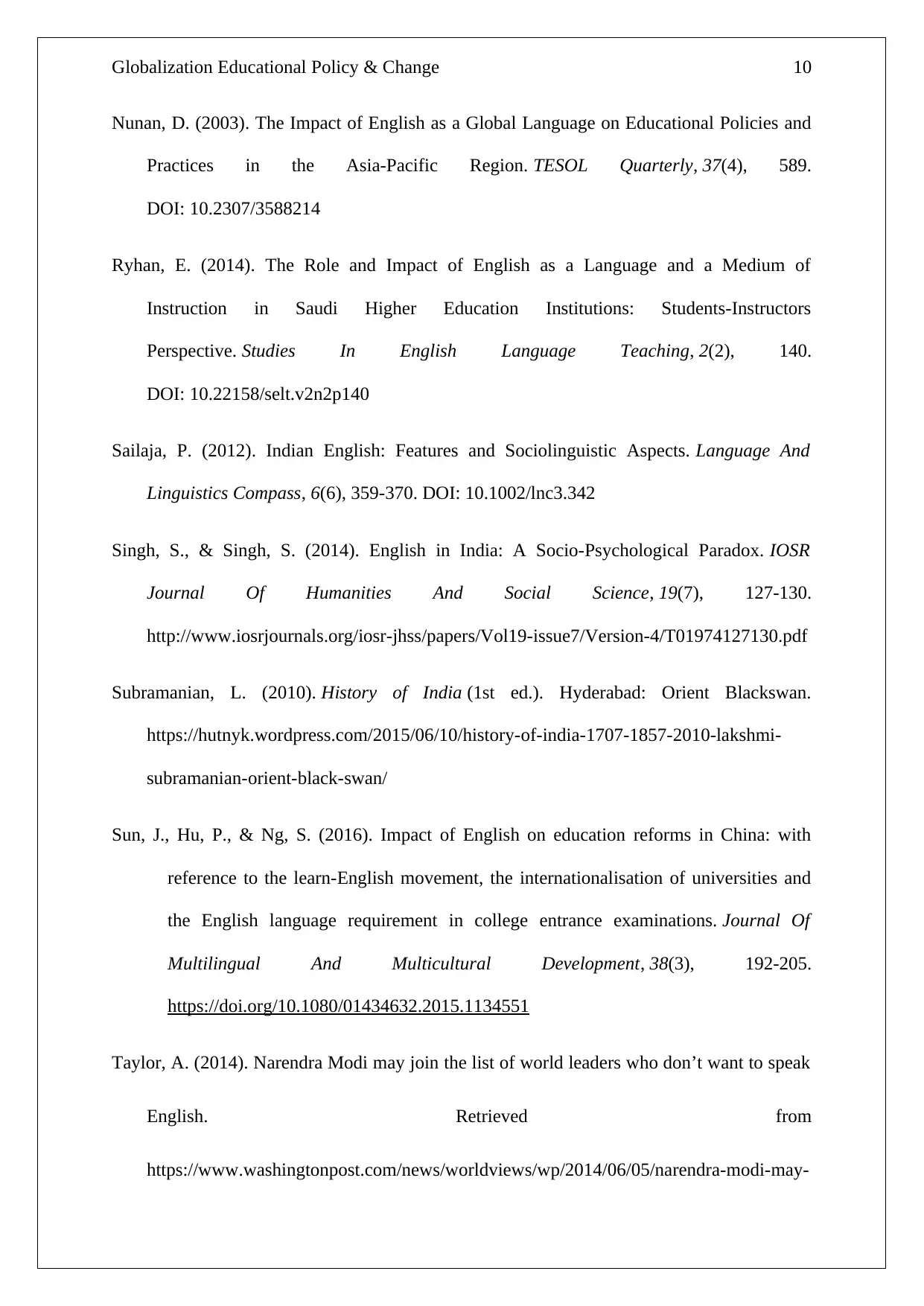
Globalization Educational Policy & Change 10
Nunan, D. (2003). The Impact of English as a Global Language on Educational Policies and
Practices in the Asia-Pacific Region. TESOL Quarterly, 37(4), 589.
DOI: 10.2307/3588214
Ryhan, E. (2014). The Role and Impact of English as a Language and a Medium of
Instruction in Saudi Higher Education Institutions: Students-Instructors
Perspective. Studies In English Language Teaching, 2(2), 140.
DOI: 10.22158/selt.v2n2p140
Sailaja, P. (2012). Indian English: Features and Sociolinguistic Aspects. Language And
Linguistics Compass, 6(6), 359-370. DOI: 10.1002/lnc3.342
Singh, S., & Singh, S. (2014). English in India: A Socio-Psychological Paradox. IOSR
Journal Of Humanities And Social Science, 19(7), 127-130.
http://www.iosrjournals.org/iosr-jhss/papers/Vol19-issue7/Version-4/T01974127130.pdf
Subramanian, L. (2010). History of India (1st ed.). Hyderabad: Orient Blackswan.
https://hutnyk.wordpress.com/2015/06/10/history-of-india-1707-1857-2010-lakshmi-
subramanian-orient-black-swan/
Sun, J., Hu, P., & Ng, S. (2016). Impact of English on education reforms in China: with
reference to the learn-English movement, the internationalisation of universities and
the English language requirement in college entrance examinations. Journal Of
Multilingual And Multicultural Development, 38(3), 192-205.
https://doi.org/10.1080/01434632.2015.1134551
Taylor, A. (2014). Narendra Modi may join the list of world leaders who don’t want to speak
English. Retrieved from
https://www.washingtonpost.com/news/worldviews/wp/2014/06/05/narendra-modi-may-
Nunan, D. (2003). The Impact of English as a Global Language on Educational Policies and
Practices in the Asia-Pacific Region. TESOL Quarterly, 37(4), 589.
DOI: 10.2307/3588214
Ryhan, E. (2014). The Role and Impact of English as a Language and a Medium of
Instruction in Saudi Higher Education Institutions: Students-Instructors
Perspective. Studies In English Language Teaching, 2(2), 140.
DOI: 10.22158/selt.v2n2p140
Sailaja, P. (2012). Indian English: Features and Sociolinguistic Aspects. Language And
Linguistics Compass, 6(6), 359-370. DOI: 10.1002/lnc3.342
Singh, S., & Singh, S. (2014). English in India: A Socio-Psychological Paradox. IOSR
Journal Of Humanities And Social Science, 19(7), 127-130.
http://www.iosrjournals.org/iosr-jhss/papers/Vol19-issue7/Version-4/T01974127130.pdf
Subramanian, L. (2010). History of India (1st ed.). Hyderabad: Orient Blackswan.
https://hutnyk.wordpress.com/2015/06/10/history-of-india-1707-1857-2010-lakshmi-
subramanian-orient-black-swan/
Sun, J., Hu, P., & Ng, S. (2016). Impact of English on education reforms in China: with
reference to the learn-English movement, the internationalisation of universities and
the English language requirement in college entrance examinations. Journal Of
Multilingual And Multicultural Development, 38(3), 192-205.
https://doi.org/10.1080/01434632.2015.1134551
Taylor, A. (2014). Narendra Modi may join the list of world leaders who don’t want to speak
English. Retrieved from
https://www.washingtonpost.com/news/worldviews/wp/2014/06/05/narendra-modi-may-
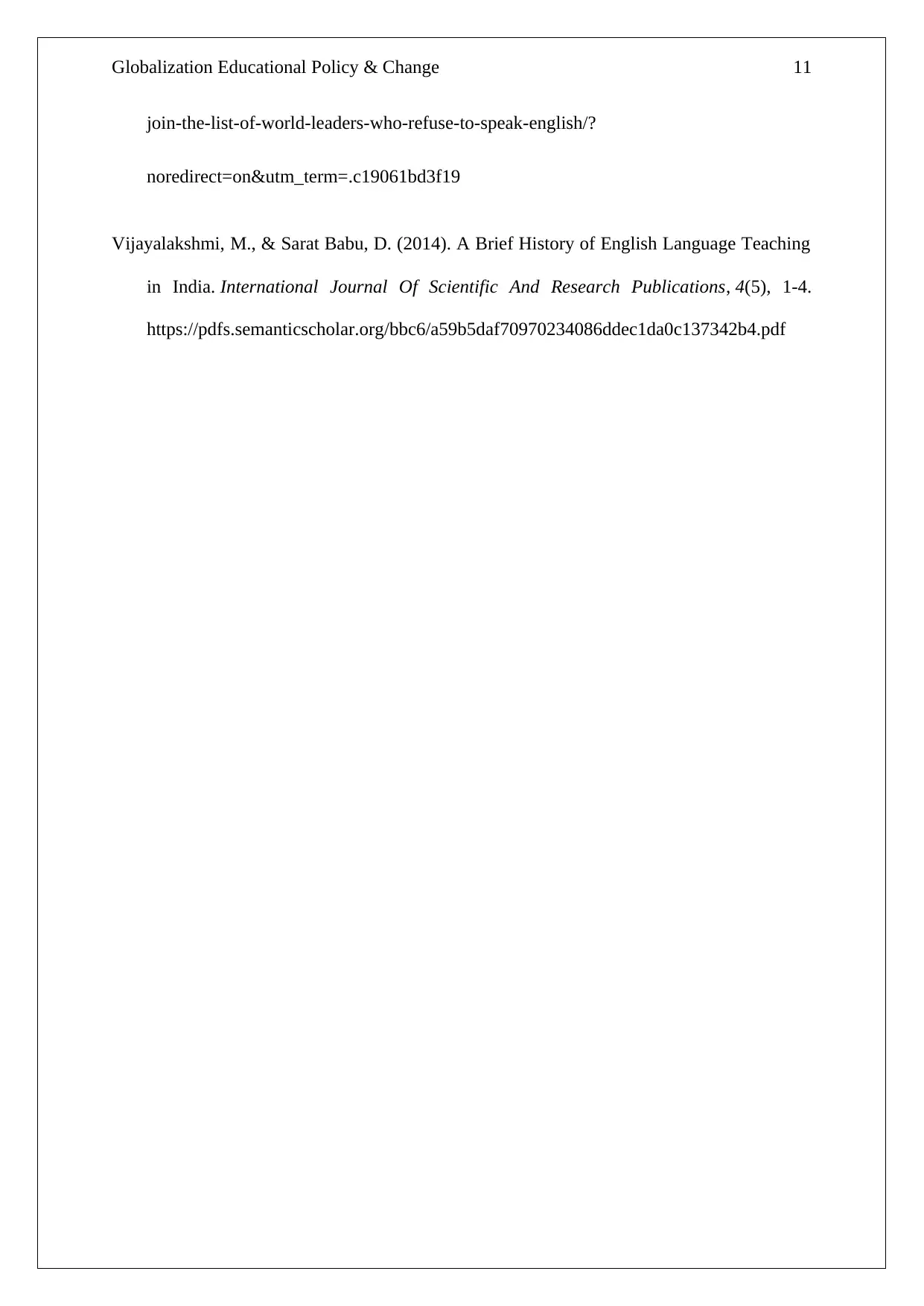
Globalization Educational Policy & Change 11
join-the-list-of-world-leaders-who-refuse-to-speak-english/?
noredirect=on&utm_term=.c19061bd3f19
Vijayalakshmi, M., & Sarat Babu, D. (2014). A Brief History of English Language Teaching
in India. International Journal Of Scientific And Research Publications, 4(5), 1-4.
https://pdfs.semanticscholar.org/bbc6/a59b5daf70970234086ddec1da0c137342b4.pdf
join-the-list-of-world-leaders-who-refuse-to-speak-english/?
noredirect=on&utm_term=.c19061bd3f19
Vijayalakshmi, M., & Sarat Babu, D. (2014). A Brief History of English Language Teaching
in India. International Journal Of Scientific And Research Publications, 4(5), 1-4.
https://pdfs.semanticscholar.org/bbc6/a59b5daf70970234086ddec1da0c137342b4.pdf
1 out of 12
Related Documents
Your All-in-One AI-Powered Toolkit for Academic Success.
+13062052269
info@desklib.com
Available 24*7 on WhatsApp / Email
![[object Object]](/_next/static/media/star-bottom.7253800d.svg)
Unlock your academic potential
© 2024 | Zucol Services PVT LTD | All rights reserved.





